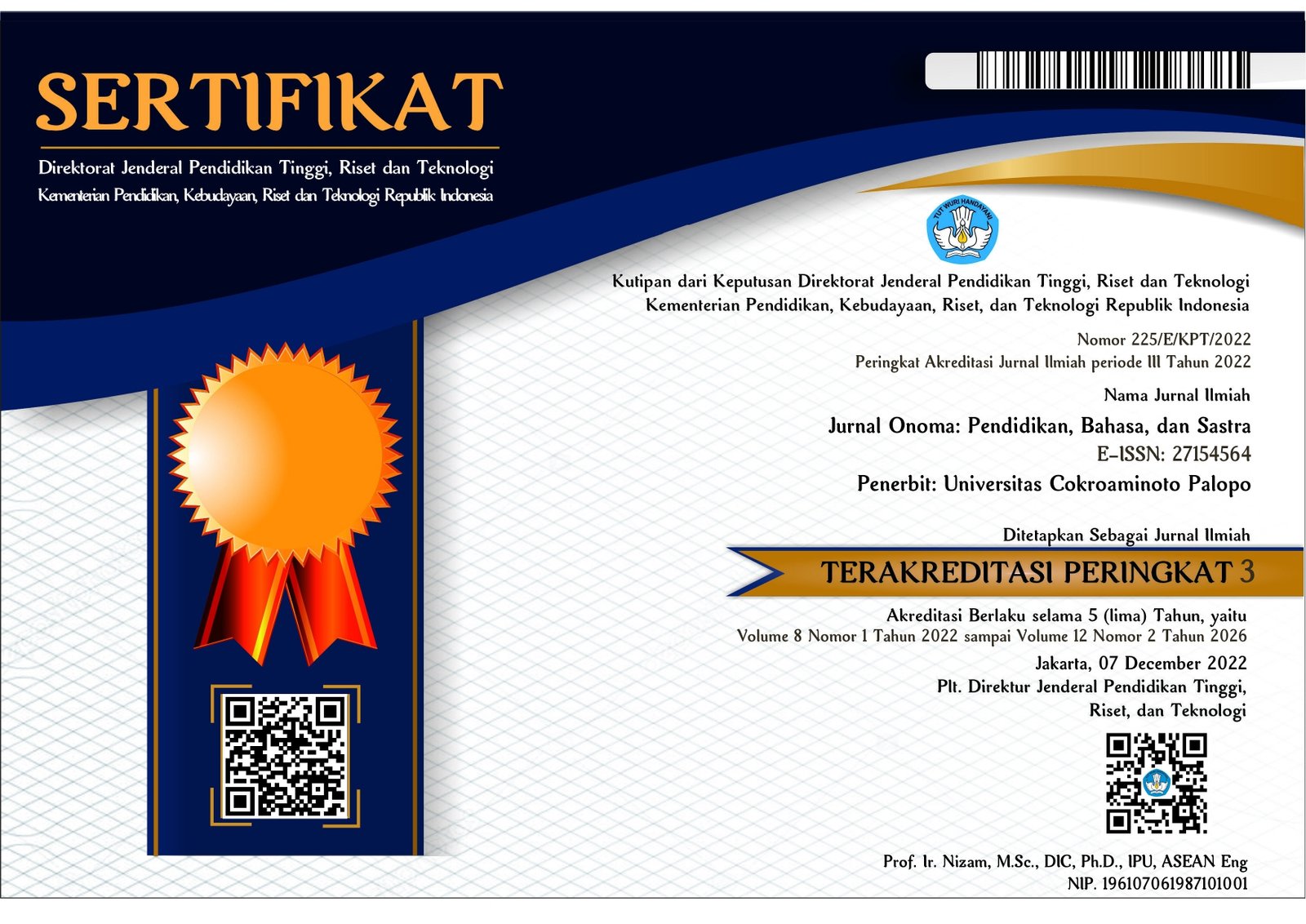Bahasa Figuratif dalam Tonis Masyarakat Dawan di Kabupaten Timor Tengah Selatan
Bahasa Indonesia
https://doi.org/10.30605/onoma.v6i2.350
Keywords:
Kata Kunci: bahasa figuratif, tonis.Abstract
Abstrak
Penelitian ini bertujuan membahas gaya bahasa yang terkandung dalam tonis (tuturan lisan) masyarakat Dawan di Kabupaten Timor Tengah Selatan. Gaya bahasa yang dibahas berupa bahasa figuratif. Penelitian ini bersifat deskriptif kualitatif, dengan data emik berupa tuturan tonis pada masyarakat Dawan di kabupaten Timor Tengah Selatan. Pengumpulan data dilakukan dengan cara mengobservasi, merekam dan mencatat. Teknik menganalisis secara deskriptif, dengan langkah mentranskripsikan data lisan ke data tulis, menerjemahkan secara bebas, mengidentifikasi, menafsirkan, dan menguraikan secara detail, lalu menarik simpulan. Hasil penelitian menunjukan adanya gaya bahasa figuratif berjenis simile, dan personifikasi yang mendominasi tonis perpisahan tersebut. Bahasa figuratif perbandingan berupa simile terdapat pada data nomor; 9, 12, 13, 15, 18; bahasa figuratif berjenis personifikasi tertera pada data 6, 9, 10, 12, 13.
Kata Kunci: bahasa figuratif, tonis.
Downloads
References
Al-Ma’ruf, Ali Imron. 2009. Stilistika Teori, Metode dan Aplikasi Pengkajian Estetika Bahasa. Surakarta: CakraBooks
Ardin, Anita Safitri, dkk. 2020. Gaya Bahasa dalam Kumpulan Puisi Perahu Kertas Karya Sapardi Djoko Damono. Palu: Jurnal Bahasa dan Sastra Tadulako
Keraf, Goris. 2008. Diksi dan Gaya bahasa. Jakarta: Gramedia.
Liubana, Metropoly M. J. dan Ibrahim Nenohai. 2020. Struktur Bunyi dalam Tonis Perpisahan Pada Masyarakat Dawan di Kabupaten Timor Tengah Selatan. Kefamenanu: E-Jurnal Jubindo Vol. 5, Nomor 2.
Pradopo, R. D. 2012. Pengkajian Puisi. Yokyakarta: Gadja Mada University Press.
Ratna, Nyoman Kuta. 2009. Stilistika Kajian Puitika Bahasa, Sastra, dan Budaya: Yokyakarta: Pustaka Pelajar.
Ratna, Nyoman Kutha. 2014. Stilistika: Kajian Puitika, Sastra, dan Budaya. Yogyakarta: Pustaka Pelajar
Sariban. 2009. Teori dan Penerapan Penelitian Sastra. Surabaya: Lentera Cendikia Surabaya.
Sudikan, Setya Yuwana. 2011. Metode Penelitian Sastra Lisan. Surabaya: Citra Wacana.
Taum, Yosep Yapi. 2011 Studi Sastra Lisan Sejarah, Teori, Metode, Pendekatan Disertai Contoh Penerapannya. Yokykarta: Lamalera.
Tarigan, Henry Guntur. 2013. Pengajaran Gaya Bahasa. Bandung: Angkasa.
Waluyo, Herman J. 1987. Teori dan Apresiasi Puisi. Jakarta : Erlangga.
Yakob, Muhamad. 2018. Eksistensi Bahasa Figuratif dalam Cerita Pendek Sungai Karya Nugroho Notosusanto. Aceh: E-Jurnal Samudra Bahasa. Vol. 1, No. 1, 2018.
Downloads
Published
How to Cite
Issue
Section
License
In submitting the manuscript to the journal, the authors certify that:
- They are authorized by their co-authors to enter into these arrangements.
- The work described has not been formally published before, except in the form of an abstract or as part of a published lecture, review, thesis, or overlay journal.
- That it is not under consideration for publication elsewhere,
- That its publication has been approved by all the author(s) and by the responsible authorities – tacitly or explicitly – of the institutes where the work has been carried out.
- They secure the right to reproduce any material that has already been published or copyrighted elsewhere.
- They agree to the following license and copyright agreement.
License and Copyright Agreement
Authors who publish with Onoma Journal: Education, Languages??, and Literature agree to the following terms:
- Authors retain copyright and grant the journal right of first publication with the work simultaneously licensed under Creative Commons Attribution License (CC BY 4.0) that allows others to share the work with an acknowledgment of the work's authorship and initial publication in this journal.
- Authors are able to enter into separate, additional contractual arrangements for the non-exclusive distribution of the journal's published version of the work (e.g., post it to an institutional repository or publish it in a book), with an acknowledgment of its initial publication in this journal.
- Authors are permitted and encouraged to post their work online (e.g., in institutional repositories or on their website) prior to and during the submission process, as it can lead to productive exchanges, as well as earlier and greater citation of published work.
















